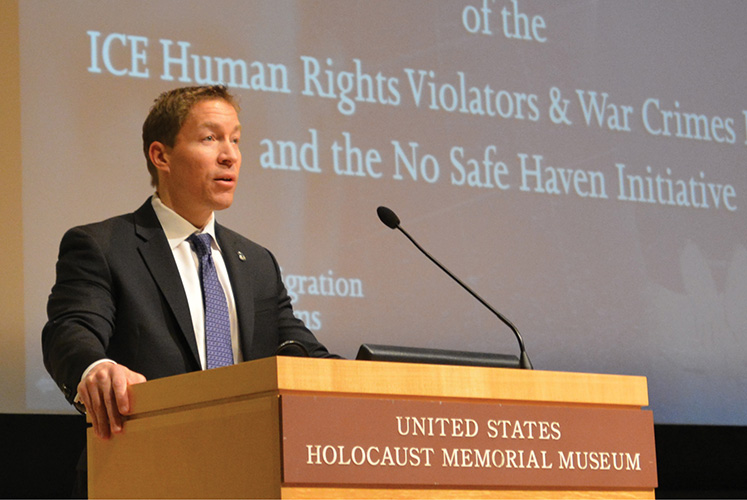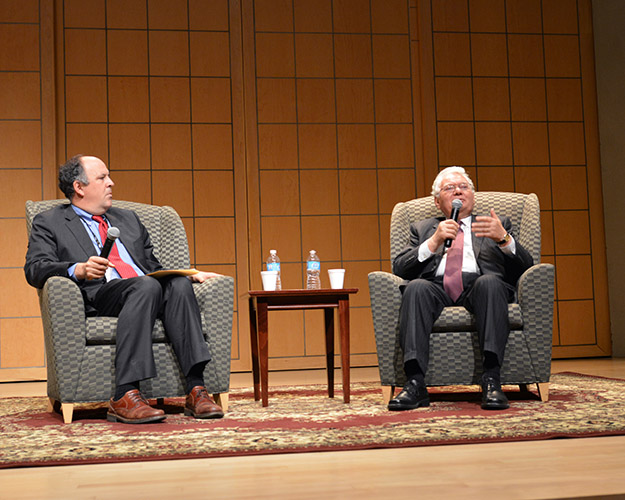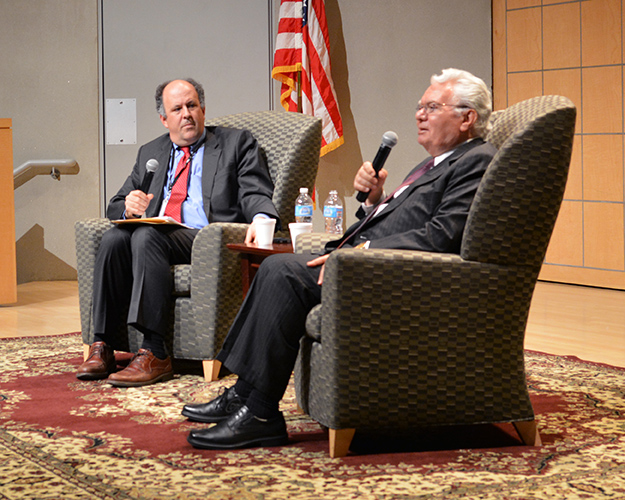ICE commemorates 10th anniversary of the Human Rights Violators and War Crimes Program
WASHINGTON — U.S. Immigration and Customs Enforcement (ICE) commemorated the 10th anniversary of its Human Rights Violators and War Crimes Program at an event held Tuesday at the U.S. Holocaust Memorial Museum in Washington to highlight the agency's commitment to holding these individuals accountable. Under the "No Safe Haven" initiative, ICE and its partners focus on investigating, prosecuting and removing human rights abusers, including Nazis and their collaborators, from the United States.
The event was attended by law enforcement and government agency partners, non-governmental organizations and others, including U.S. Department of Homeland Security (DHS) officials, special agents, attorneys, historians and analysts who have supported the mission.
The purpose of the event was to increase the public's awareness of ICE's Human Rights Violators and War Crimes Center and to recognize the work ICE and its partners have accomplished over the past 10 years. Working collaboratively, the center's partners have brought numerous individuals to justice for human rights-related violations, including those who committed atrocities during the 1994 Rwandan genocide, the conflicts in the former Yugoslavia during the 1990s, the "Red Terror" in Ethiopia, the Argentine "Dirty War, the 1982 Dos Erres massacre in Guatemala, the war in El Salvador and the Liberian Civil War.
Since 2009, more than 600 ICE special agents and officers have participated in the Holocaust museum's Law Enforcement and Society: Lessons of the Holocaust program developed in conjunction with the Anti-Defamation League, which examines the role law enforcement officers played in the Holocaust and challenges them to reflect upon their professional and personal responsibilities in a democracy today.
Keynote speakers included the Honorable Thomas Buergenthal, Lobingier Professor of Comparative Law and Jurisprudence at George Washington University Law School, and State Department Ambassador-at-Large for War Crimes Issues Stephen J. Rapp. Mike Abramowitz, director of the U.S. Holocaust Memorial Museum's Center for the Prevention of Genocide was the master of ceremonies.
Buergenthal said, "This is a very important program in the worldwide struggle for the protection of human rights because it can be very effective seeking to ensure that violators of human rights will not find a protective haven in the United States. It should be widely publicized to encourage other countries to adopt similar programs."
Ambassador Rapp stated, "Through our own prosecutions and our support of cases in international and other national courts, the United States has consistently demonstrated a commitment to holding human rights violators accountable for their crimes, no matter the nationality of the alleged violator or the place of violation."
Since the mid-1970s, the former Immigration and Naturalization Service investigated immigration fraud related to former Nazis who entered the United States following the end of World War II. In the mid-1990s, this effort shifted to investigating ‘modern' human rights abusers who entered the United States. When ICE was created in 2003, the investigation and prosecution of human rights violators remained a priority.
The Human Rights Violators and War Crimes Center was originally undertaken as a pilot program by ICE in April 2008 and based on the success of the pilot program, the center was formally declared operational in October 2009 to foster an ‘agency-wide' approach to the human rights violator mission by leveraging the resources of various offices that play a role in dealing with these offenders. The center's mission is to: prevent the admission of foreign war crimes suspects, persecutors and human rights abusers into the United States; deny human rights violators safe haven in the United States; and identify, investigate, prosecute and remove human rights violators from the United States whenever possible.
The Human Rights Violators and War Crimes Center uses a variety of sources and methods to identify human rights abusers living in the United States or attempting to enter the United States. The center works with international and national tribunals, foreign law enforcement partners, and INTERPOL to develop lead information. Non-governmental organizations and academics play a critical role in assisting ICE in locating and supporting witnesses, and in contextualizing conflicts so that judges and juries can understand the role the perpetrators played in the abuse.
The center works with the Department of Justice, which is responsible for the criminal prosecutions of these cases. Non-government organizations have partnered with ICE to provide justice to victims and their families in numerous cases and to bring to light and document abuses committed around the world. Members of the public who have information about foreign nationals suspected of engaging in human rights abuses or war crimes are urged to call the toll-free ICE HSI Tip Line at 1-866-DHS-2-ICE or complete its online tip form. Both are staffed around the clock. To learn more about assistance available to victims in these cases, the public should contact HSI's confidential victim-witness toll-free number at 1-866-872-4973. Tips may be provided anonymously.
Since fiscal year 2004, ICE has arrested more than 250 individuals for human rights-related violations under various criminal and immigration statutes. During that same period, ICE obtained deportation orders and removed more than 640 known or suspected human rights violators from the United States. Currently, HSI has approximately 170 active investigations and the agency is pursuing approximately 1,850 leads and removal cases involving suspected human rights violators from 97 different countries.
Over the last four years, ICE's Human Rights Violators and War Crimes Center has issued more than 21,000 lookouts for people from more than 111 countries and stopped approximately 129 human rights violators or war crime suspects from entering the United States.




